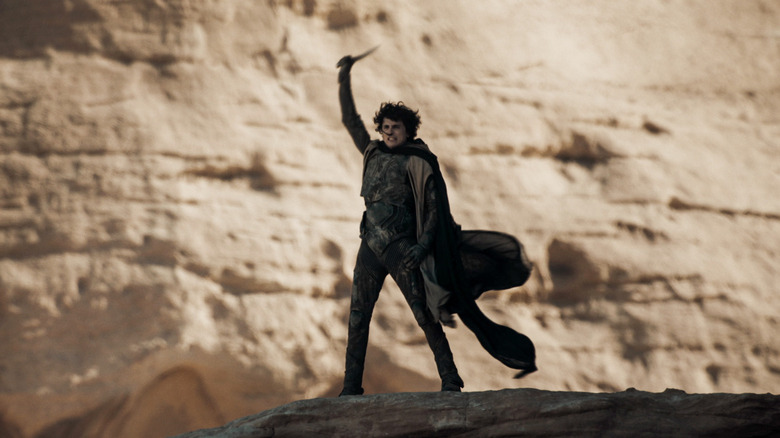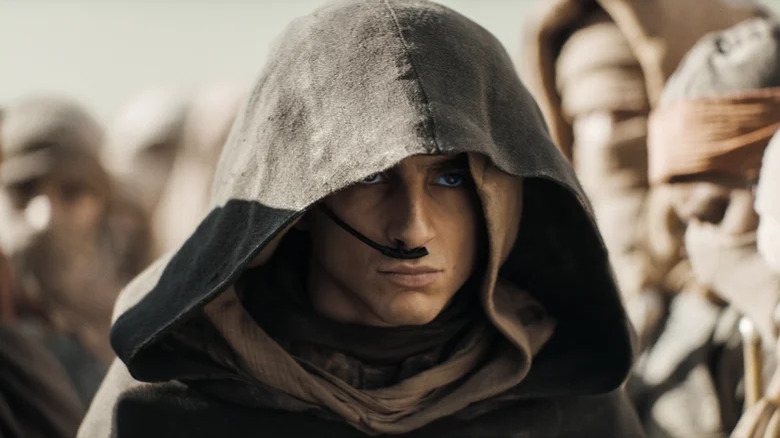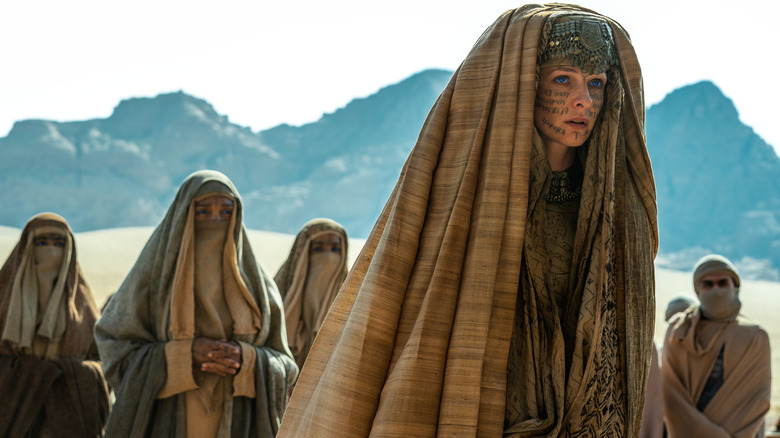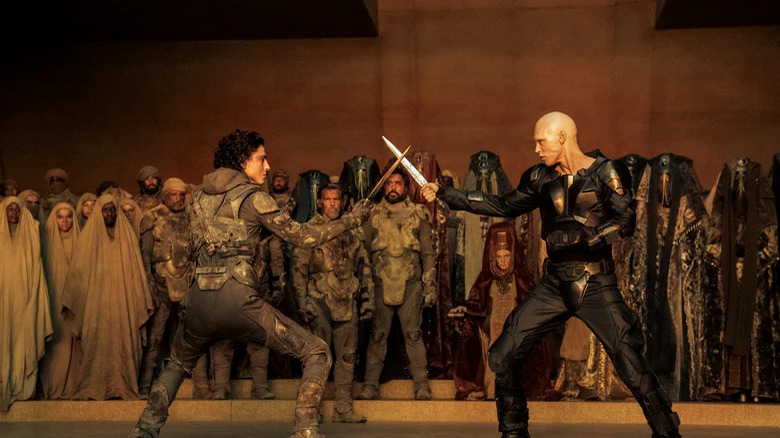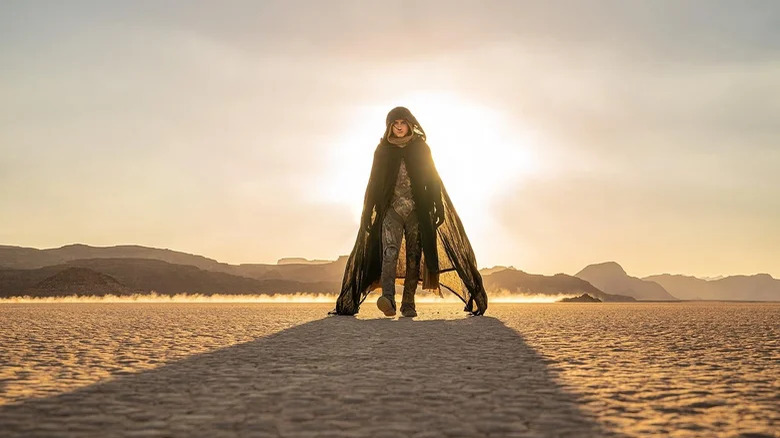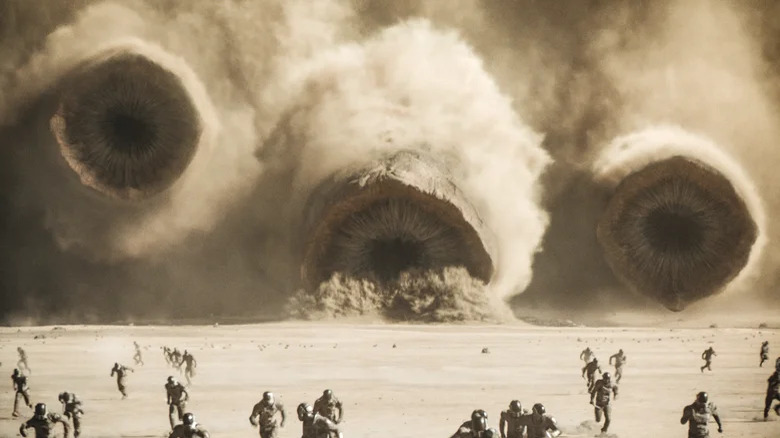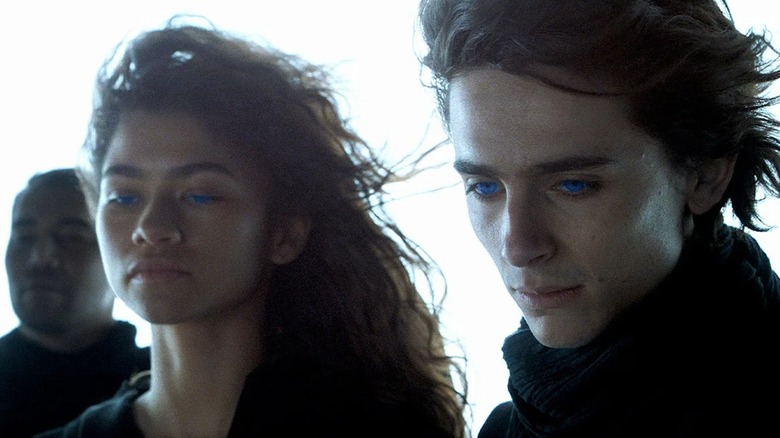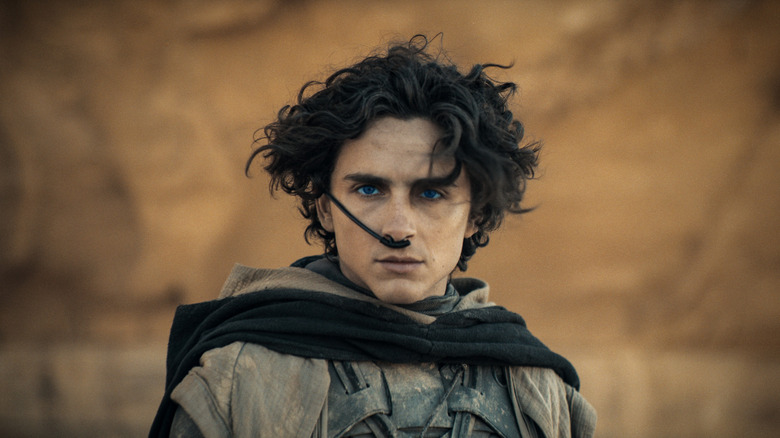Dune: Part Two Ending Explained: Be Careful Of Messiahs
This article contains spoilers for "Dune: Part Two."
Frank Herbert's "Dune" is one of the most influential and praised science-fiction books of all time. Herbert's novel is a fun space adventure with a simple premise: a duke's son and his family move to a new world at the Emperor's request. There, they are betrayed, and the young man will have to embark on a journey of self-discovery as he musters new allies as well as his own nascent powers, to reclaim what was lost and defeat the Emperor.
On paper, that sounds like standard space fantasy. But Herbert's book is special because it also contains an intricate political web, complex themes, a poignant message about the dangers of messiahs, meticulous worldbuilding that few writers have ever replicated, and nuanced characters, all while being weird as heck.
Denis Villeneuve's "Dune: Part One" (aka simply "Dune") did a great job of making Herbert's story feel like a true cinematic event — one with an eye for giant spectacle and stunning cinematography. The filmmaker's "Dune: Part Two" only doubles down on the themes from the first part, resulting in what Chris Evangelista described in his review for /Film as "one of the bleakest blockbusters ever made."
But as fantastic and full of action as the movie is, "Dune: Part Two" also has a very dense narrative that feels more like a companion to the original book than an adaptation, dropping plenty of elements, characters, and whole storylines. This is where we come in. If the incredible sight of massive sandworms riding into battle distracted you and made you miss something, or if you want to double-check your take on the movie (or maybe simply want to relive the spectacle of it all), this is how the ending of "Dune: Part Two" goes down.
Dreams are messages from the deep
"Dune: Part Two" picks up right where the first one left off. After witnessing the total obliteration of his life and his house, Paul Atreides (Timothée Chalamet) and his mother Jessica (Rebecca Ferguson) have taken refuge with the Fremen, the native people of the desert planet of Arrakis. The Padishah Emperor of the Known Universe, Shaddam Corrino IV (Christopher Walken, as the movie's secret weapon) and his ally Baron Vladimir Harkonnen (Stellan Skarsgård) consider the Fremen to be a nuisance, a minor inconvenience — Paul knows different.
His father, the late Duke Leto Atreides (Oscar Isaac), recognized that the Fremen were a formidable force and planned to make an alliance with them to fight the Emperor. In the first movie, he had his best warrior, the incredibly named Duncan Idaho (Jason Momoa) make contact with the Fremen and begin diplomatic relations. This paid dividends, as a Fremen leader called Stilgar (Javier Bardem) did not immediately kill Paul on sight but was open to hear him out.
Most of the movie deals with Paul learning to be one with the Fremen, becoming accustomed to their ways, and integrating into their culture, while resulting the urge to become their religious leader as part of the prophecy of the Lisan al Gaib. While Paul's father paved the way for Paul to have an army, his mother Jessica and the Bene Gesserit order she belongs to paved the way for him to have an entire cult devoted to his name. For centuries, Bene Gesserit missionaries sowed the seeds of superstition amongst the Fremen, spreading myths and prophecies about the coming of a messiah, a Lisan al Gaib, the son of a Bene Gesserit. The moment Paul and Jessica arrived on Arrakis, the people started seeing the signs.
An ecologist dream
There's another, equally important aspect to Paul's rise to power that Villeneuve's "Dune: Part Two" mostly skips — the ecology. This is mostly context found in the appendices of the novel.
In the book, we learn of Liet Kynes' father, Pardot. Like Liet, Pardot was an Imperial planetologist and was the first such scholar to study Arrakis. Where most saw the planet as cruel and uninhabitable, Kynes saw a place ready to be reshaped, a paradise in the making. When he met the Fremen, Kynes would speak of oceans, grass, and date palms. His every word became gospel to the Fremen, who took to Kynes' vision of a terraformed Arrakis and his 500 year-plan to turn the hostile dune into a paradise.
Over the years, Kynes introduced greenery to Arrakis, as well as various desert animals. Under his watch, even food plants came to Arrakis. The more he did, the holier he became to the Fremen, who considered him a prophet. Kynes also taught the Fremen to use catchbasins, large underground facilities housing huge amounts of water. Even the water from the dead is reclaimed by their tribe and fed into the catchbasin, which was to be used to terraform Arrakis.
Even after Kynes was killed in a cave-in, his daughter Liet carried on the work of secretly leading the Fremen towards their ultimate goal of turning Arrakis into an Eden. As writer Matt Colville put it, Kynes caused a religious conversion. "This planetologist converts them all in one generation from zealots of religion, to being zealots of ecology."
This is essential to Paul's story in "Dune: Part Two." The moment Paul says that the Fremen's dream of a green Arrakis is now also his dream, that he will take them to paradise, the Fremen fervently follow.
How to become a messiah, for dummies
All of this is to say that the moment Paul is introduced to the Fremen, they are ready to embrace him as their savior. All Paul has to do is reach out and harness the desert power his father hoped for.
The problem is that Paul knows that power also brings disaster. Ever since the first movie, Paul is fully aware that the Fremen were manipulated into accepting him as a leader, no matter his competence. What's more, throughout "Dune: Part Two," Paul struggles with visions of an impending great war that will come about, if he become a leader of the Fremen. Under his command, billions will die across the universe.
Though many start believing the signs, Paul's paramour Chani (Zendaya) is more skeptical of an outsider becoming a Fremen messiah. She is the only one who sees a problem with the zealotry around Paul. Sadly, she is not enough to dissuade the masses, especially once Paul's mother Jessica begins to spread his gospel and sing his praises for every Fremen to see. As much as Paul tries to deny his path, the Fremen are ready for their messiah. And who could blame them. If the holy plan they've been preparing for can be reduced a few centuries, that seems like a sweet deal.
Then there's House Harkonnen, the Great House that caused the destruction of Paul's ancestral house of Atreides. Back in control of Arrakis, Baron Vladimir Harkonnen now sets his sights on the throne of the known universe, plotting against Shaddam IV, to replace him. As Paul and the Fremen disrupt the spice melange trade on Arrakis, the Baron appoints his nephew Feyd-Rautha (Austin Butler, putting on his best Stellan Skarsgård voice) to lead the charge on Arrakis, part of his plan to make him emperor.
Muad'Dib, the one who points the way
Though Paul is initially content with being part of the Fremen and just using guerilla tactics to stop the Harkonnens from extracting and shipping spice from Arrakis, everything changes when an all-out attack by the Harkonnens destroys the Fremen hideout Sietch Tabr. Seeing the death and destruction, Paul embraces the signs, becomes Muad'Dib Usul, and declares himself the Lisan al Gaib, much to Stilgar's glee. Paul even drinks some sandworm bile to gain more prescient powers.
With the help of an entire planet's worth of Fremen warriors and invaluable desert power, Muad'Dib goes on the offensive and declares an all-out war on the Harkonnen fortress and the Emperor himself. Also very helpful is the fact that Paul's mentor Gurney Halleck (Josh Brolin) reunites with them and tells them of the Atreides family atomic weapons supply.
Though Chani continues to be resistant to the idea of the Lisan al Gaib, knowing full well it is pure superstition that Paul is falling into, she cannot stop the zealotry. Muad'Dib has become a name even the Emperor grows concerned with — and with good reason.
Muad'Dib and the Fremen mount an attack on the capital of Arrakis, using sandworms and atomics to obliterate the Harkonnen army. Then, Muad'Dib forces the Emperor to abdicate the throne after winning a thrilling knife fight with Feyd-Rautha (serving as the Emperor's champion). Muad'Dib vows to stop his attacks and to continue the spice trade, only if he gets the throne and also the hand of the Emperor's daughter.
Rather unsurprisingly, the Great Houses don't accept the young Atreides' ascendancy, so Muad'Dib declares war on the rest of the universe. As he feared, the prophecy is fulfilled, and a jihad begins in Paul's name, bringing death and destruction to the universe.
Messianic myths and violent wars
Herbert's "Dune" was many things. It was a meticulous exploration of how ecology impacts everything from flora and fauna to even culture. It was also a traditional hero's journey of a young boy defeating an empire. But more than anything, "Dune" is a story about the dangers of messianic figures.
Denis Villeneuve's film adaptation sadly ignores or rushes through many aspects of the "Dune" books — Mentats who? — but that also means "Dune: Part Two" has enough time to fully explore the horrors of Paul's messianic turn and make them explicit. At no point does the movie try to make Muad'Dib a hero or even someone we should root for. There's no clearer hint of this than Stilgar's role in the book.
Bardem's portrayal of the Fremen leader is almost cartoonish in how comically fanatical he is. Every time Paul does, well, anything, he preaches it as a sign that he is the Lisan al Gaib. If Paul says he is not the Lisan al Gaib, Stilgar takes it as proof of the humility the real Lisan al Gaib would have.
Another telling sign of the Fremen's horrific devotion for Paul is the image of burning bodies in the aftermath of the battle against the Harkonnens. We learn early in the movie that the Fremen value water above all else. But rather than harvest the water of the dead Harkonnens, we see their bodies burn. Granted, it is possible they simply consider the Harkonnen so monstrous they aren't even worth harvesting water from. But it is also a sign of their zealotry toward Paul Muad'Dib and his vision. After all, why continue harvesting water if the Lisan al Gaib promises to turn your world into a green paradise with enough water you can drown in?
Muad'Dib's holy war on the universe
This is why Chani's altered role is so effective in "Dune: Part Two." Rather than a companion partner in battle, she's Paul's biggest critic throughout the movie. At every turn, she calls Paul out on the dangers of an outsider leading the Fremen and using them to wage war on people they don't care about. If there is any doubt that Paul's rise to power is meant to be a bad thing, remember that the first "Dune" literally begins with Chani asking who the Fremen's next oppressors will be, before cutting to an image of Paul Atreides. By the end of the film, she is utterly horrified of Muad'Dib (as she should be).
As an anime fan, watching "Dune: Part Two" makes it hard not to think of "Attack on Titan" and Eren's story (which also involves a protagonist trapped by his desire for revenge becoming a messianic figure and then a monster). The anime played Eren's morals ambiguously for a long while, keeping the audience at arm's length of Eren's motivations, which allowed audiences to debate whether he was right or wrong until the end. That is not the case with Villeneuve's "Dune: Part Two." The movie avoids ambiguity by staying locked in Paul's perspective and showing us his premonitions. From the very beginning, Paul and the audience are fully aware of where his path leads, and it is not pretty.
This makes his struggle and resistance to the prophecy of the Lisan al Gaib relatable, because we understand the desire to avenge those we love while also fearing its consequences. Paul is never afraid of things getting out of control, and instead, he's worried about them going his way. When he sets his plan in motion, and it starts working, it hurts. Paul may have avenged his father's death. He may have won a battle. But at what cost?
Children of Dune Messiah
We've known for a while that Denis Villeneuve wants to adapt the second book in Herbert's series, "Dune Messiah," bringing an end to his trilogy. Now that "Dune: Part Two" is out, it's easy to see why.
Without diving too deeply into spoilers, "Dune Messiah" finishes Paul's story by focusing on the aftermath of his holy war and the destruction he brings to the universe and his loved ones. Paul has brought peace, freedom, justice, and security to his new empire, but he also killed billions upon billions in his holy war. In the book, Paul not only compares himself to Hitler, but to multiple Hitlers.
"Dune Messiah" makes it abundantly clear that Paul is no hero, as Herbert wrote the novel in response to audiences misunderstanding the message of his original novel. Of course, this isn't very surprising, given how other movies and stories with very clear bad people, like "Watchmen" and "Starship Troopers," continue to be misunderstood to this day.
As Villeneuve once said, "My adaptation [of 'Dune'] is closer to his idea that it's actually a warning [against messiahs and heroes]." To fully bring the idea home, we need to see the destruction Paul causes not just in liberating Arrakis but in invading other worlds. We need to see the consequences of him starting a cult, a religion in his name. We need a reckoning for Paul.
If Villeneuve succeeds, it could do what the "Star Wars" prequels tried but failed to properly sell: a tragedy about a young boy who hoped to be a hero but found himself becoming a monster feared throughout the universe. Granted, Anakin did not know from the beginning that he'd cause a genocide if he became a Jedi, but still, the point stands.
The future of Dune
Sure, there are other things to look forward to if Villeneuve makes "Dune Messiah." Key among them is his promise to show how, exactly, the Fremen get off the sandworms they use as Uber rides.
But one thing the filmmaker should keep in mind, if he gets to finish his trilogy, is to bring forth the ecological element of the books. "Dune: Part Two" does a good job of showing how connected the ecology of Arrakis is to Fremen culture, from the plants, to the water, to the animal life. "Dune Messiah" is in every way a rebuke of Paul as a leader, including his promise to turn Arrakis to a paradise.
While the Lynch movie ended with rain falling on Arrakis for the first time, not bothering to show the implications of this, "Dune Messiah" is very wary of this plan. Without going into spoilers, any plan to make Arrakis green is bound to have disastrous consequences for the Fremen and the universe at large. A movie that manages to convey this could make for a devastating and quite memorable tragedy that further buries Paul as a tragic figure.
Beyond that, who knows? Villeneuve doesn't seem to want to adapt the other books in the series, even if it sadly means depriving the audience of a human-worm hybrid in "God Emperor of Dune." But maybe another filmmaker will pick up where he leaves off.
